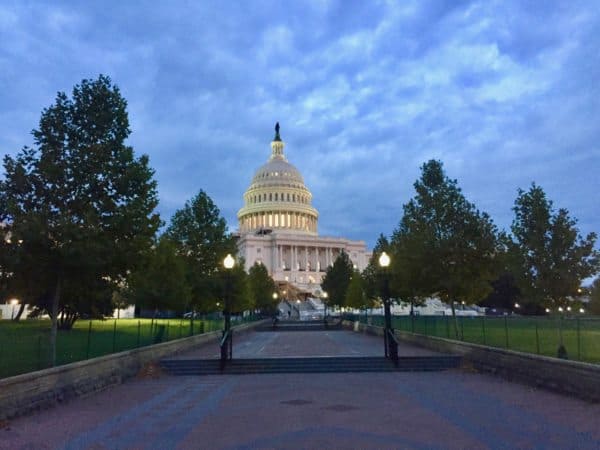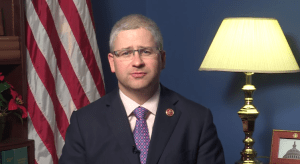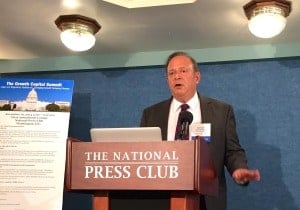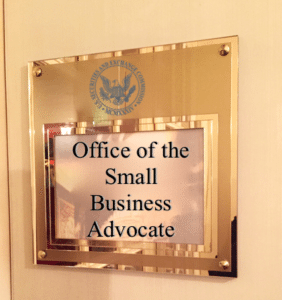
With a new administration set to take the reins of power in the White House in January 2017, not to mention a new, Republican appointed Chair of the SEC in the offing, when it comes to the interests of small business’s access to capital, many things are now possible – indeed likely.
Today I would like to focus on a particular piece of legislation, now pending in the Senate, one of a number of important pending or proposed legislative reforms, which I and others consider vital to advancing the interests of SME’s to access capital – both in the deliberative process at the SEC, and in Congress. The Bill, H.R. 3784, introduced in the Senate as S. 2867, is a piece of “common sense” legislation which would establish a permanent, independent office at the SEC, whose exclusive charge would be to represent, and advocate for, the interests of SME’s, both internally, and as a spokesperson for SME’s on Capitol Hill. The bill is largely patterned after a similar bill which was part of the Dodd-Frank Act of 2010, creating an independent office of Investor Advocate.
After being voted out of the House Financial Services Committee, and ultimately the full House of Representatives, by voice vote, it now sits in the Senate in the Banking Committee, awaiting action – or inaction – as the case may be. The bill is likely to see action, sooner or later, in view of the changing of the guard at the White House – not to mention the Commission. In my view, the sooner the better. Hopefully, a majority in the Senate will share that view.

So who could be opposed to such a bill, and why? It seems to fit in well with Mom and Apple Pie. Right? After all, who could object to having a dedicated, independent voice, and advocate, for small business at the SEC?
Well, it seems there are still some doubters on the Senate side. This article is intended to speak to those fence sitters, on both sides of the aisle – not to mention our President-Elect Donald J. Trump, who is on the hunt for meaningful reforms in Washington which will grow our economy – and fuel the creation of new jobs.
Oddly, it seems that I was the first person to publicly advocate for an independent voice for SME’s at the SEC. I do not take too much credit for this, as this is a common sense proposal – even more so following Dodd-Frank’s creation of an Office of Investor Advocate at the SEC back in 2010. Instead, and very sadly, what this reflects, in my opinion, is the absence of voices in Washington dedicated to interests of small business, and their need to access capital. Yes, there are some – but they are heavily outnumbered – and outspent. History alone tells us that this has not been a fair fight, when it comes to addressing the need of small business to access capital.
Small business needs a legislative fix to even the playing field – both at the SEC and in Congress.
 Not only my view. Others, with a better vantage point than me at the SEC, have echoed this sentiment in no uncertain terms. Former SEC Commissioner, Daniel M. Gallagher, who left his post as Commissioner after four years in October 2015, had this to say on the subject, in a major address delivered at The Heritage Foundation in September 2014, aptly titled: “What Ever Happened to Promoting Small Business Capital Formation”:
Not only my view. Others, with a better vantage point than me at the SEC, have echoed this sentiment in no uncertain terms. Former SEC Commissioner, Daniel M. Gallagher, who left his post as Commissioner after four years in October 2015, had this to say on the subject, in a major address delivered at The Heritage Foundation in September 2014, aptly titled: “What Ever Happened to Promoting Small Business Capital Formation”:
“But small business has a big collective action problem here in Washington, where it is regularly and systematically underrepresented in the legislative and regulatory process. Small business owners are focused on making ends meet and growing their businesses, not hiring high-priced lobbyists to influence policy. Big businesses and unions, by contrast, can afford to hire lobbyists to develop relationships with politicians and regulators—which is the way business in the U.S. increasingly gets done. As an SEC Commissioner, I believe that this issue warrants the agency’s highest level of priority. And, as the son of two long-time small business owners, I take this issue personally.”
No surprise that, in that same speech, Commissioner Gallagher was the first public official to publicly address the need for an independent office at the SEC devoted exclusively to advancing the interest of SME’s, being one of the most outspoken, and effective, advocates for small business at the SEC in my lifetime.
And so, I believe the SEC needs to create an Office of the Small Business Advocate, reporting to the Commission. This office would be modeled on the Office of the Investor Advocate created by the Dodd-Frank Act. There’s a natural parallel here, in that our staff perennially faces difficulty in receiving views from certain segments of the market that find it difficult and expensive to participate in the normal notice and comment rulemaking process: retail investors and small businesses. Having a single point of contact for outreach to these underrepresented groups, who can then turn around and advocate their views to the staff, is critical. Finally, just as the Investor Advocate now runs the Investor Advisory Committee, the Small Business Advocate could take charge of the SEC’s Advisory Committee on Small and Emerging Companies and the Government-Business Forum, an incredibly important group that does not have the profile it deserves at the Commission.
My sources tell me that there are still some doubters on the Senate side. On this piece of legislation there ought to be no doubt. Yes, there is the perennial opposition of everything which would empower small business at the SEC and in the capital markets. To name one – that powerful and well funded (and “state sponsored”) North American Securities Administrators Association (NASAA). Also, some inside the SEC are not sanguine, to say the least, about the prospects that this change in the status quo would bring. Unfortunately, necessary change often disrupts the status quo.
Many industry organizations have already weighed in on the record in support, including the U.S. Chamber of Commerce, National Venture Capital Association, National Small Business Association, Small Business Investor Alliance, SBEC, and BIO, the largest organization representing the biotech industry. Also in the mix was the Crowdfunding Professional Association (CfPA), under my leadership as Chair and President when the bill was originally introduced into the House of Representatives back in 2015.
So Why are there Still Doubters?
To be fair, there are, and have been, doubters on both sides of the aisle. Some question whether there is a need to “expand” any governmental agency. Others question how effective a Small Business Advocate would be. The most potent and pointed response to these doubters might be in the form of data – a tactic which some folks (NASAA) recently used as a sword to dismember the most recent legislative effort to resuscitate federal investment crowdfunding, Congressman McHenry’s Fix Crowdfunding Act, H.R. 4855.
 Unfortunately, it is difficult to quantify, or datify if you will, the need for a dedicated small business advocate. Much of the story is told in what has not happened – and thus cannot be easily quantified. Alas, not all stories must be told with numbers, even in this digital age.
Unfortunately, it is difficult to quantify, or datify if you will, the need for a dedicated small business advocate. Much of the story is told in what has not happened – and thus cannot be easily quantified. Alas, not all stories must be told with numbers, even in this digital age.
History alone will not convince all of the doubters, measured by the progress that small business capital formation reforms have made since 1980, when a bi-partisan Congress enacted a host of legislative initiatives intended to empower small business at the SEC. So I turn this conversation to some concrete, recent qualitative examples of why an independent small business advocate is necessary at the SEC.
Sometimes it Takes Some Red Meat to Change Minds.
Though I was not called upon to testify in support of H.R. 3784, here is some of what I would have put in the record.
Example No. 1 – Intrastate Crowdfunding.
Back in April 2014 the Staff at the SEC’s Division of Corporation Finance issued an informal, non-binding ruling, opining that states could not allow for broad, unrestricted internet solicitation in state legislation relying upon the federal exemption from registration, Section 3(a)(11), which in simple terms leaves it up to the states as to how best regulate securities offerings within their state.
I personally was “inflamed,” not only because this ruling reflected an about face on earlier rulings allowing broad solicitation, in radio, TV and newspapers, even when it crossed state lines,” but because it took away a powerful and inexpensive tool for small businesses to reach outside of their inner circle when seeking much needed capital. So inflamed, I penned two articles on the subject, followed by a meeting with ranking members of the SEC’s CorpFin staff. I was told in no uncertain terms that there were some (unnamed) people inside the SEC’s headquarters who did not share my view that internet solicitation was a good thing, when it came to capital formation. Others, including a former president of the Crowdfunding Professional Association, were also shown the “hand” on this issue by the Staff. To put a fine point on this, when I left my meeting at SEC headquarters, I was consoled by another Staff member, who aptly remarked in a sympathetic manner that I was “beating my head against the wall.” Yes, there was a wall. And my head was exploding.
And the salt on the wound – the Commission was still dragging its feet on adopting proposed crowdfunding rules under Title III of the JOBS Act.
Ultimately the Commission Saw the Light
In 2015, in what I believe was a response to state securities administrators outraged by the SEC’s position, the SEC made intrastate crowdfunding, and SEC Rule 147, a priority, ultimately proposing new rules in October 2015. In what I described in my formal comment letter on the proposed rule, what the Commission had proposed was a Faustian bargain of sorts – it would allow state legislatures to enact provisions allowing broad internet solicitation – but at a price. The Feds sought to cap the amount raised in any year to $5 million.
As history would have it, rule commenters were almost universally opposed to this cap – hence it was removed when the final rules were enacted in October 2016.
So What Difference Would a Small Business Advocate Have Made?
Well, I believe that if small business had a strong, independent voice at the table back in 2014, that Staff ruling would never had seen the light of day, and instead we would have seen much needed rulemaking, ultimately implemented in October 2016. The ruling went against the grain of prior SEC pronouncements and published views of noted SEC scholars, Rutheford B. Campbell, to be precise – an influential voice in the enactment of regulations implementing Title IV of the JOBS Act, Regulation A.
Given that the new, final rules do not go into effect until April 2017, many startups, and would be startups, lost the opportunity for three years to utilize the internet to reach out to accredited and non-accredited investors in their own community.
Moreover, this ruling directly impacted state legislatures contemplating intrastate crowdfunding legislation. In my home state of California, yet to enact a crowdfunding statute due to intense lobbying efforts of the payday lenders, the Committee text to one of the bills stated that California was essentially forced to craft this legislation under another federal rule, Rule 504, which carried with it at that time an SEC mandated limit of $1 million per year.
And well, those legislatures which had enacted intrastate crowdfunding legislation back in 2014, or earlier – their local entrepreneurs would have to pound sand – when it came to the use of the internet – for three years.
Example No. 2 – Making Sausage out of a Pure Beef “Fix Crowdfunding Act”
I like many others, like sausage. Undoubtedly, I would forever renounce it if I witnessed the process by which it were made. So too, apparently, 86% of the American electorate, fed up with business as usual in Congress. Those with “access” can get things done in D.C., be it through high paid lobbyists or well placed political partisans. As former SEC Commissioner Dan Gallagher pointed out, small businesses don’t stand a chance.
 We saw the result of this (but not the cause) as Congressman McHenry’s pristine Fix Crowdfunding Act fell victim to Washington sausage making before it was voted out of Committee. Though it was ultimately voted out of the House Financial Services Committee, and subsequently the full house, the amended bill fell victim to partisan deal making, losing one of its most vital provisions, what would have allowed would be investment crowdfunders to “test the waters” – in other words to interact with the public, through social media and the internet, to gauge interest in their business and their financing plan – before filling out all of the paperwork necessary to commence the formal offering process.
We saw the result of this (but not the cause) as Congressman McHenry’s pristine Fix Crowdfunding Act fell victim to Washington sausage making before it was voted out of Committee. Though it was ultimately voted out of the House Financial Services Committee, and subsequently the full house, the amended bill fell victim to partisan deal making, losing one of its most vital provisions, what would have allowed would be investment crowdfunders to “test the waters” – in other words to interact with the public, through social media and the internet, to gauge interest in their business and their financing plan – before filling out all of the paperwork necessary to commence the formal offering process.
Though universally supported by the crowdfunding industry and small business advocates alike, it was opposed, on the record, by NASAA. Not enough data for them yet, it seemed. At least that is what their spokesperson, William Beatty, stated on the Congressional record.
OK, no surprise there. NASAA can always be counted upon to oppose any reform which would widen the spigot of capital to early stage businesses – too risky for the investing public they say.
But Here is the Big Surprise!
 Much of the important deliberations in Washington occur behind closed doors, outside the eyesight and hearing of the public. After all, sausage making is ugly.
Much of the important deliberations in Washington occur behind closed doors, outside the eyesight and hearing of the public. After all, sausage making is ugly.
Less known, and unsettling to say the least, is that according to a highly credible Capitol Hill source, at least one SEC official weighed in on the testing the waters provision of the Fix Crowdfunding Act, behind the closed doors of a Congressional member of the House Financial Services Committee. In that person’s view, the testing the waters provision did not belong in the Fix Crowdfunding Act.
Wouldn’t it have been nice if there were a designated point person at the SEC who could freely and openly advocate for the interests of small business, both behind closed doors – and openly in Congressional hearings?
That is exactly what the pending Small Business Advocate Bill would allow. A dedicated, independent voice, to weigh in not only in Congress, but with some “bully pulpit” authority, now lacking, in the internal rulemaking deliberations of the SEC.
 And well, those NASAA folks, they seem to be cutting off their nose to spite their face on the battle against testing the waters provisions. After all, public internet-based solicitation before an offering formally commences would provide an early warning system for state regulators, on the hunt for the next securities fraud du jour. As one of my favorite State Securities Administrators and former NASAA President has remarked, Joe Borg, at the helm in the State of Alabama, the challenge of state regulators is to catch bad actors before the forest is burned to the ground – leaving victims who may have lost their life savings to fraudsters with no effective recourse.
And well, those NASAA folks, they seem to be cutting off their nose to spite their face on the battle against testing the waters provisions. After all, public internet-based solicitation before an offering formally commences would provide an early warning system for state regulators, on the hunt for the next securities fraud du jour. As one of my favorite State Securities Administrators and former NASAA President has remarked, Joe Borg, at the helm in the State of Alabama, the challenge of state regulators is to catch bad actors before the forest is burned to the ground – leaving victims who may have lost their life savings to fraudsters with no effective recourse.
Also argued by opponents to testing the waters in investment crowdfunding: it will have the impact of conditioning investors’ minds before they are afforded full disclosure. Well, it seems that the Fix Crowdfunding Act squarely addressed this concern, by expressly providing that material departures from testing the waters material would need to be highlighted as such in the mandatory SEC disclosure accompanying the formal offer and sale process.
 And for those investor protectionists concerned for perhaps the largest vulnerable population, the elderly, more than half of that population suffers from some form of dementia by time they reach their 80’s. Surely they need protection from bad actors. But let’s get real. It is unlikely, indeed impossible, that anyone with an impaired short term memory will be mentally conditioned by anything for very long.
And for those investor protectionists concerned for perhaps the largest vulnerable population, the elderly, more than half of that population suffers from some form of dementia by time they reach their 80’s. Surely they need protection from bad actors. But let’s get real. It is unlikely, indeed impossible, that anyone with an impaired short term memory will be mentally conditioned by anything for very long.
So for those who question whether an independent small business advocate is necessary. I say: it is both essential – and long overdue. And for those concerned about cutting government spending: plenty left, unutilized, in the current SEC budget, according to this week’s Congressional record. And I would expect that with a dedicated focus at the SEC on the interests of SME’s, this would reap oversized financial dividends for years to come – in terms of more focused SEC rulemaking and federal legislation – and more capital in the hands of this Nation’s largest engine of job creation – small business.
I rest my case.
The article above is part of a series of articles that Crowdfund Insider will be publishing regarding the transition in Presidential administrations. The content will focus on necessary policy initiatives to foster economic growth and job creation by encouraging capital formation for SMEs and innovative startups.
 Samuel S. Guzik, a Senior Contributor to Crowdfund Insider, is a corporate and securities attorney and business advisor with the law firm of Guzik & Associates, with more than 30 years of experience in private practice. Guzik is also former President and Board Chair of the Crowdfunding Professional Association (CfPA) and currently CfPA Legislative & Regulatory Special Counsel. A nationally recognized authority on the JOBS Act, including Regulation D private placements, investment crowdfunding and Regulation A+, he is and an advisor to legislators, researchers and private businesses, including crowdfunding issuers, service providers and platforms, on matters relating to the JOBS Act. As an advocate for small and medium sized business, he has engaged with major stakeholders in the ongoing post-JOBS Act reform, including legislators, industry advocates and federal and state securities regulators. In 2014, some of his speaking engagements have included leading a Crowdfunding Roundtable in Washington, DC sponsored by the U.S. Small Business Administration Office of Advocacy, a panelist at the MIT Sloan School of Business 2014 Crowdfunding Roundtable, and a panelist at a national bar association event which included private practitioners, investor advocates and officials of NASAA. His articles on JOBS Act issues, including two published in the Harvard Law School Forum on Corporate Governance and Financial Regulation, have also served as a basis for post-JOBS Act proposed legislation.
Samuel S. Guzik, a Senior Contributor to Crowdfund Insider, is a corporate and securities attorney and business advisor with the law firm of Guzik & Associates, with more than 30 years of experience in private practice. Guzik is also former President and Board Chair of the Crowdfunding Professional Association (CfPA) and currently CfPA Legislative & Regulatory Special Counsel. A nationally recognized authority on the JOBS Act, including Regulation D private placements, investment crowdfunding and Regulation A+, he is and an advisor to legislators, researchers and private businesses, including crowdfunding issuers, service providers and platforms, on matters relating to the JOBS Act. As an advocate for small and medium sized business, he has engaged with major stakeholders in the ongoing post-JOBS Act reform, including legislators, industry advocates and federal and state securities regulators. In 2014, some of his speaking engagements have included leading a Crowdfunding Roundtable in Washington, DC sponsored by the U.S. Small Business Administration Office of Advocacy, a panelist at the MIT Sloan School of Business 2014 Crowdfunding Roundtable, and a panelist at a national bar association event which included private practitioners, investor advocates and officials of NASAA. His articles on JOBS Act issues, including two published in the Harvard Law School Forum on Corporate Governance and Financial Regulation, have also served as a basis for post-JOBS Act proposed legislation.


 And so, I believe the SEC needs to create an Office of the Small Business Advocate, reporting to the Commission. This office would be modeled on the Office of the Investor Advocate created by the Dodd-Frank Act. There’s a natural parallel here, in that our staff perennially faces difficulty in receiving views from certain segments of the market that find it difficult and expensive to participate in the normal notice and comment rulemaking process: retail investors and small businesses. Having a single point of contact for outreach to these underrepresented groups, who can then turn around and advocate their views to the staff, is critical. Finally, just as the Investor Advocate now runs the Investor Advisory Committee, the Small Business Advocate could take charge of the SEC’s Advisory Committee on Small and Emerging Companies and the Government-Business Forum, an incredibly important group that does not have the profile it deserves at the Commission.
And so, I believe the SEC needs to create an Office of the Small Business Advocate, reporting to the Commission. This office would be modeled on the Office of the Investor Advocate created by the Dodd-Frank Act. There’s a natural parallel here, in that our staff perennially faces difficulty in receiving views from certain segments of the market that find it difficult and expensive to participate in the normal notice and comment rulemaking process: retail investors and small businesses. Having a single point of contact for outreach to these underrepresented groups, who can then turn around and advocate their views to the staff, is critical. Finally, just as the Investor Advocate now runs the Investor Advisory Committee, the Small Business Advocate could take charge of the SEC’s Advisory Committee on Small and Emerging Companies and the Government-Business Forum, an incredibly important group that does not have the profile it deserves at the Commission.